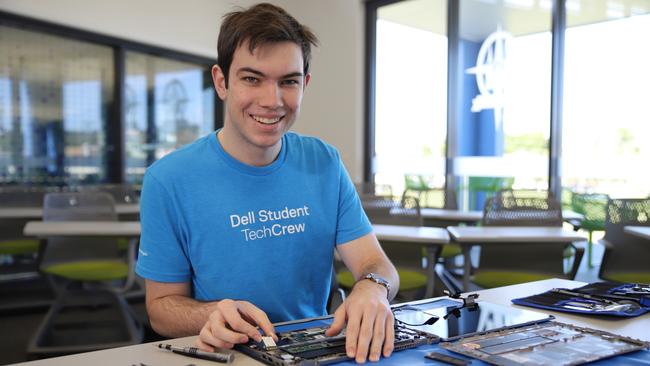The Queensland school where the IT staff are the students
At a small catholic school in a central Queensland town regarded as the beef capital of Australia, it’s the students who run the IT department.

At a small catholic school in a central Queensland town regarded as the beef capital of Australia, it’s the students who run the IT department.
About six kids at The Cathedral College in Rockhampton, each qualified with an IT certificate from Dell, run a service desk where they fix laptops, troubleshoot and teach others about IT.
The students form part of Dell Student Tech Crew, one of several that ran at schools across the nation last year as Dell looks to harness the next generation of tech workers.
William Canavan, a grade 12 student at the college who was part of last year’s pilot, said the program helped students use the skills they learned in class first-hand.
“Before I was on the program, our school ran the digital tech class which covered a lot of the same topics with networking and how computers work, but there was nothing as hands-on and that had the same sort of experience opportunities as this program offered,” he said.
William said students had the opportunity to work with a Dell team in the US to troubleshoot problems.
“The highlight was that we were connected to a facility, I think it was in Texas, where they had the rugged lab and they showed us all the different tests they do and that was a very interesting experience.”
The school’s ICT manager, Aaron Nunn, who helped guide the program, said he was looking to expand the tech crew to up to 15 to 20 kids. “The template we’re using is that our grade elevens from last year become our seniors this year, who are also able to assist with helping to run the classes,” he said.
Trenton Cockburn, the head of the Tech Crew program in Australia and New Zealand, said it formed part of a Dell 2030 program to equip young people with the skills to work.
“This certification enables the students to carry out (work) on Dell mobile devices,” he said. “It is specific to Dell devices, but device components are generic to the industry so it’s only a small step to move to a non-Dell device.”
Dell K-12 executive sponsor Katrina Lawrence said the company understood that “politically we’ve got a really important part to play in building a steady pipeline of digitally skilled talent”.
“We’re experiencing a skills gap of about 150,000 technology workers across Australia at the moment and by 2030 it is expected to be a global skill shortage of 4.3 million roles,” she said.
Ms Lawrence said while many tech companies had taken to investing in university programs, research showed many kids lost interest in pursuing technology in their early years of high school.
“If you're going to lose interest in the technology subject path, you generally lose it around about the age of 13 or 14,” she said. “We’re seeing more success in capturing the hearts of the kids when they’re in that pivotal point in grades seven to nine, and bringing them into something like this where they grab those digital skills.”
William said although he wasn’t looking at an IT career, he was interested in engineering and computer science: “So while I might not go into IT specifically, the program has opened up a lot of possibilities and has given me a lot of really good insights into how IT staff work and how they operate behind the scenes.”







To join the conversation, please log in. Don't have an account? Register
Join the conversation, you are commenting as Logout